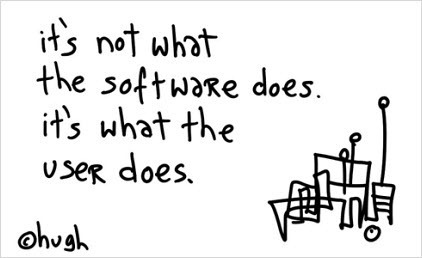 The trouble with any discussion about social media is that, more often than not in my experience, a clear definition of the term ‘social media’ hasn’t been agreed by the parties to the discussion.
The trouble with any discussion about social media is that, more often than not in my experience, a clear definition of the term ‘social media’ hasn’t been agreed by the parties to the discussion.
The result sometimes is elevated temperatures in the discussion as everyone has a different meaning in mind to support their argument.
I mention this thinking about a lively discussion about social media that my podcasting partner Shel Holtz and I had yesterday during recording of FIR 594, the latest episode of our weekly business podcast. The discussion centred on Goodbye social media… welcome back mass-media, a post on ZDNet by Tom Foremski in which he argued that we should retire the term ‘social media’ as, in Tom’s view, we ought to be talking about the social distribution of media rather than social media. Read his post for the full story.
As Shel and I started discussing this, it became clear that we were missing a key aspect – how Tom defined ‘social media.’ He hadn’t in his post. So Shel and I came at the subject from different perspectives as we each had a different view in mind of what Tom might have meant in his use of the phrase ‘social media.’
So how do you define ‘social media’?
The staple definition is often the Wikipedia entry, which currently starts like this:
Social media are media for social interaction, using highly accessible and scalable communication techniques. Social media is the use of web-based and mobile technologies to turn communication into interactive dialogue.
I don’t know about you, but that doesn’t really help me understand what social media means, does or lets me do.
A few years ago, Wikipedia’s definition was easier to understand and I often used it in seminars and presentations alongside one I developed at that time (early 2008) to help explain social media and get into some discussion about it, its value and benefit to organizations.

Yet that doesn’t really work, certainly not today, with its exclusive focus on tools and channels. What about people and behaviours? Hugh MacLeod said it well in 2007: it’s about what the user does with the software, ie, the tools and the channels.

So what about today?
This very topic came up earlier this year on the FIR podcast, leading Joe Thornley to offer this definition:
Social media are online communications in which we shift instantly and easily between the role of audience and creator – without needing to know how to code. We do this by using social software that incorporates functions like publishing, sharing, friending, commenting, linking and tagging
It’s a good one, much better than my 2008 effort and it is inclusive: it’s about the software and the user, with a strong focus on people.
In the UK, the CIPR has this definition in their social media best practice guide published this month:
Social media is the term commonly given to Internet and mobile-based channels and tools that allow users to interact with each other and share opinions and content. As the name implies, social media involves the building of communities or networks and encouraging participation and engagement.
Not bad although I like Joe’s definition better. And I’m not entirely sure how or if any of these would have worked in Tom Foremski’s post.
Is it time to seek a new way to define the evolving media landscape, as Tom suggests? But does that make too many assumptions based on the word ‘media’?
How would you define social media?












8 responses to “How would you define social media?”
To be honest, I can’t define social media. I use the word because it is on everyone’s minds and helps me set a baseline. But if you ask me, what I in fact do is help people communicate on the web.
It doesnt matter if it is a blog, a wiki, or an entirely new communication technology, what matters is helping people build a solid place for a meaningful dialogue with key publics.
Thanks for that perspective, Bruno. It’s actually something I hear a lot these days.
Social Media is netiquette.
In my presentations I use a mashup of the dictionary definitions of social and media and it comes out as something like,
“news and opinions that influence us(media), from (or through) people we have a relationship with (social)”
Of course, it brings up as many questions as it answers, like “what constitutes a relationship?” but as an introduction it provides a helpful distinction from 20th century mass media.
I see your focus, Simon. Missing the engagement aspect, though, don’t you think? And maybe it’s not just about people with whom you already have a relationship: what about connecting with people you might like to have one with? Of course, all that’s great for a discussion!
[…] How would you define social media? (nevillehobson.com) […]
I am in the same boat. I am currently in a communication theory class and this is the kind of stuff we cover. I feel that “social media” is more of a tent term. It covers a lot and it is hard to nail down and really define. I think one difficulty is that media today is used for so many things that lines of explanation are becoming harder and harder to draw. Great thoughts, I enjoyed reading the article!
[…] How would you define social media? by Neville […]